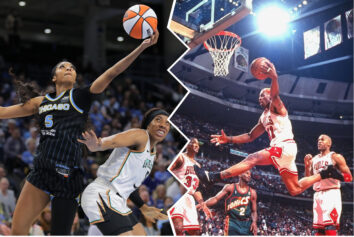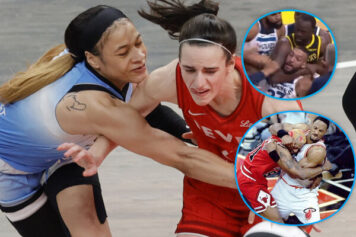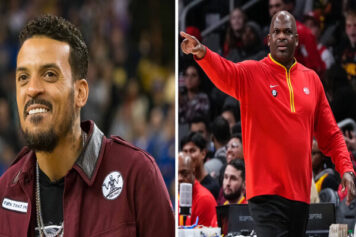Regardless of what George Karl said about Metta World Peace’s hit on Kenneth Faried, which resulted in another flagrant-2 foul for the pugnacious Lakers forward, WP isn’t a dirty player. Neither was Ron Artest.
He’s always gone hard on the court, from his childhood growing up in The Queensbridge housing projects to his stint in Mike Jarvis’ fight club at St. John’s. His shifty, gritty and grimy court etiquette has often gotten him in trouble and gained him a reputation of being a bit over-the-top with his aggression .
“It’s not like I brought this aggression to the league,” World Peace said, in a recent ESPNLA.com article. “I didn’t invent this. This is what we saw. The Bill Laimbeers and the [Dennis] Rodmans, they play hard and they wasn’t trying to hurt anybody. They played with passion. We grew up wanting to play with passion. We’re not playing dirty. We want to win.”
WP is shocked that an old school guy like Karl, doesn’t understand the method to his madness.
“Growing up as a kid, I remember playing in Far Rockaway [N.Y.],” WP said. “Far Rockaway is like the New Orleans of New York. If you go into their hood and you play hard [there are repercussions]. I never back down… My man got hit over the head with a bottle—boom—at the free-throw line while he’s shooting free throws. Bats and guns come out. We got to get out. The next day we go to another hood to play ball.”
WP’s college teammate, Tyrone Grant, said it wasn’t much different under Jarvis in college. Grant says WP was the instigative elbow of Jarvis’ strong-arm style, which took The Johnnies to the Elite Eight in ’99 .
“His practices were like gladiator sessions,” Grant told The Shadow League. If players had a problem with each other during practice, Coach would just let us really fight it out for five minutes after practice, then we’d all hang out.”
Survival of the fittest is all MWP knows. You can’t expect him to switch up his hustle after 14 years. Before the name change, and before he became an NBA champion, he was just Ron Artest—a Queens hood legend. He honed his skills in the frigid winter weather, on the rugged playgrounds of the QB Houses, the largest public housing complex in America, where crack sales, gun shots, robberies and high-priced basketball games coordinated and regulated by local drug kingpins was a way of life. It also provided the content rappers like Nas and Mobb Deep sold as the soundtracks of their lives.
East Coast pride runs deep like Namath to Maynard. Most cats from the inner-city houses didn’t root for the Lakers. They rooted for Detroit’s Bad Boy Pistons. When the Knicks of the ’90s were balling and brawling, the only cats you could find on the project benches were the junkies looking for loose rocks dropped by hustlers who rushed up to the 27th floor to watch The Knicks-Heat game on Ya Ya’s big-screen.
You had to be tough just to get run in your own hood. God forbid you were giving dudes the business at a live spot like Rucker Park or West 4th, talking junk and costing cats a ½ ki in the process. You might end up a body in the trunk.
In the ’80s in Queens, you could get shot for dropping 40 on the wrong team, in the wrong hood. The drug game was heavy and cats had money to blow on things like bets on local park basketball games. The pressure was immense and ballers had to play like their lives depended on it, because sometimes they did. You might win, but you might not make it back to the train.
As the ’90s rolled around and the drug game slowed, so did the high-stakes basketball tournaments. But for the next generation of ballers like WP, the street mentality and sense of urgency remained. It adds to his eclectic, passionate personality. In this world of complacent, high-priced athletes, at least you know WP gives a damn. That’s quite obvious in all he does.



